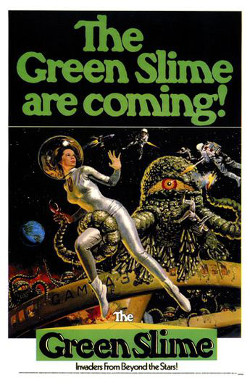
A puzzle from University of Michigan philosopher Kendall Walton:
“Charles is watching a horror movie about a terrible green slime. He cringes in his seat as the slime oozes slowly but relentlessly over the earth, destroying everything in its path. Soon a greasy head emerges from the undulating mas, and two beady eyes fix on the camera. The slime, picking up speed, oozes on a new course straight toward the viewers. Charles emits a shriek and clutches desperately at his chair. Afterwards, still shaken, he confesses that he was ‘terrified’ of the slime.”
Was he? Walton says no. Charles may have felt intense fear, even shrieking as the slime approached the camera. But he knew that he was not literally in danger. This was not a half-belief or a “gut” feeling — he never considered leaving the theater or calling the police, for instance. Charles wasn’t motivated to avoid the slime physically. Yet he says that what he felt was fear of the slime.
What are we to make of this? “This issue is of fundamental importance,” Walton writes. “It is crucially related to the basic question of why and how fiction is important, why we find it valuable, why we do not dismiss novels, films, and plays as ‘mere fiction’ and hence unworthy of serious attention.” What is the answer?
(Kendall Walton, “Fearing Fictions,” Journal of Philosophy, January 1978.)
